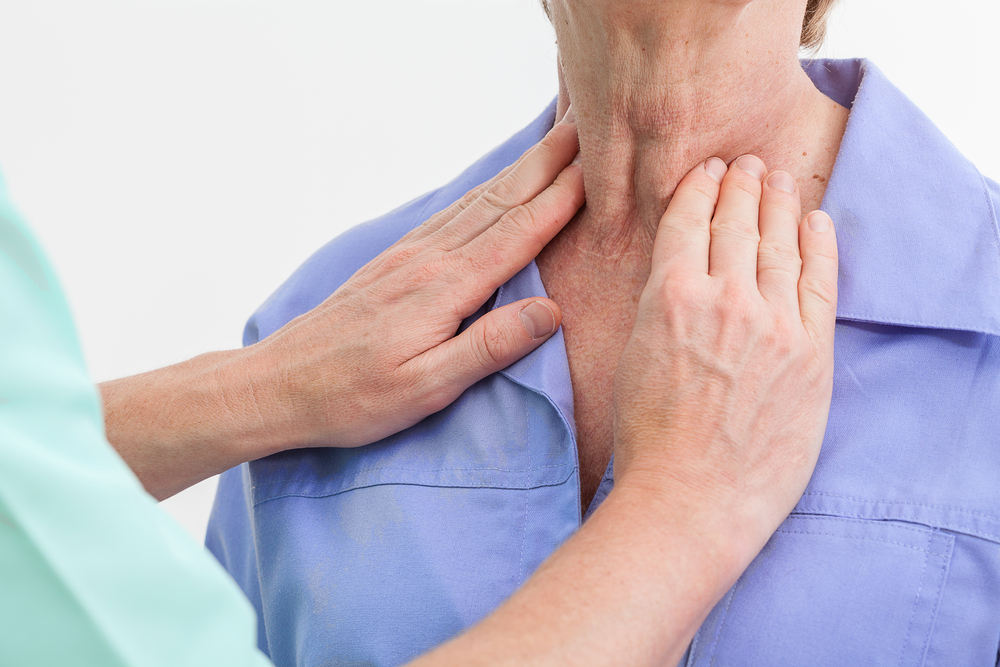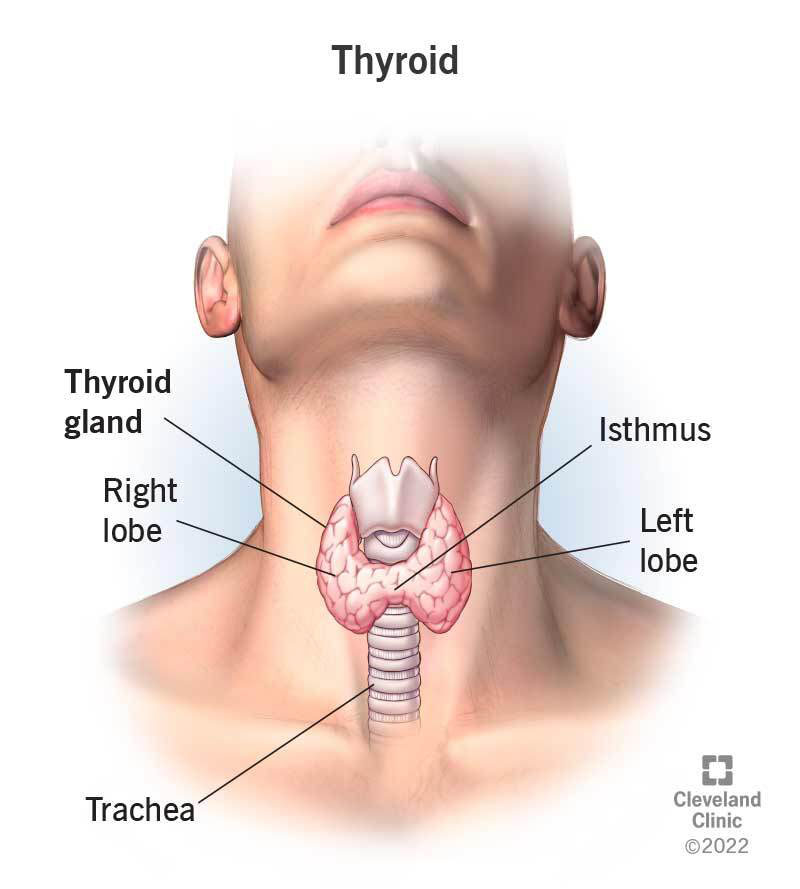
The thyroid gland is a small but very important organ of the endocrine system, located at the front of the human neck, near the trachea. It plays an essential role in regulating metabolism, energy production, thermoregulation, growth and many other body functions. The thyroid gland is shaped like a butterfly, and its weight in an adult is about 15-20 grams. This organ produces two main hormones: thyroxine (T4) and triiodothyronine (T3), which are necessary for the normal functioning of the body.
Thyroid hormones T3 and T4 are iodinated hormones that regulate a variety of physiological processes, including energy intake, heart rate, heat production, and metabolism. Thyroxine (T4) is the main hormone produced by the thyroid gland, but it is less active than triiodothyronine (T3), which is the main active thyroid hormone in the body. Most of the T3 in the body is produced from T4 in peripheral tissues such as the liver and kidneys, where T4 is converted to the more active form of T3.
What are the functions of the thyroid gland?
The thyroid gland is a critical organ of the endocrine system located at the front of the human neck, in front of the trachea. Its main function is to produce, store and release hormones into the blood, which are necessary for the regulation of the body's metabolism. The thyroid hormones thyroxine (T4) and triiodothyronine (T3) play an essential role in a variety of vital functions, so thyroid disorders can have wide-ranging effects on human health.
Regulation of metabolism
One of the main functions of the thyroid gland is to regulate metabolism. T3 and T4 hormones increase oxygen consumption and basal metabolic rate, which means they increase energy production and consumption throughout the body. It affects many systems, including the cardiovascular, nervous and digestive systems, as well as regulating body temperature and maintaining normal skin condition.
Promoting growth and development
Thyroid hormones are very important for normal growth and development, especially bone growth and brain development in childhood. Deficiency of T3 and T4 in childhood can cause delays in physical and psychomotor development, such as cretinism, which is characterized by intellectual disability and growth retardation.
Regulation of the cardiovascular system
Thyroid hormones directly affect the work of the cardiovascular system, increasing the frequency and strength of heart contractions, as well as promoting a larger volume of blood in the blood vessels. This increases the amount of blood pumped by the heart and improves the supply of oxygen and nutrients to the whole body.
Effects of nervous system activity
Thyroid hormones play an important role in the functioning of the nervous system, including the growth and differentiation of neurons, as well as the production and release of neurotransmitters. They contribute to cognitive functions such as learning and memory and emotion regulation.
Support for the reproductive system
Although the effects of thyroid hormones on the reproductive system are not as direct as on other systems, their proper balance is necessary for the normal functioning of the reproductive organs in both men and women. An imbalance of thyroid hormones can cause menstrual cycle disorders, infertility and complications during pregnancy.
The process of thyroid hormone production and release is regulated by a complex feedback mechanism involving the hypothalamus and pituitary gland to ensure proper hormone levels in the body. It is important to note that thyroid disorders such as hypothyroidism, hyperthyroidism, inflammation of the thyroid gland (thyroiditis) or thyroid neoplasms require medical attention because they can have serious health consequences.
Thyroid disorders
Thyroid disorders include a variety of conditions that can affect the function of this small but very important endocrine organ. The thyroid gland, located at the front of the human neck, plays an essential role in regulating metabolism, heat production, growth and development through the hormones it produces, thyroxine (T4) and triiodothyronine (T3). Thyroid disorders can cause either too much (hyperthyroidism) or too little (hypothyroidism) production of these hormones, each with specific symptoms and complications. In addition, thyroid disorders can include autoimmune diseases, congenital conditions, thyroid nodules, and cancer.
- Hypothyroidism. Hypothyroidism is a condition where the thyroid gland does not produce enough hormones. This can lead to a variety of symptoms, including weight gain, fatigue, depression, chills, dry skin and hair, menstrual irregularities in women, and reduced cold tolerance. Hypothyroidism has many causes, including autoimmune Hashimoto's thyroiditis, certain medications, radiation therapy, and thyroid surgery. Treatment usually involves thyroxine (T4) replacement therapy.
- Hyperthyroidism. Hyperthyroidism is a condition where the thyroid gland produces too many hormones. Symptoms may include weight loss, palpitations, anxiety, tremors, heat intolerance, increased sweating, and muscle weakness. The most common cause of hyperthyroidism is Graves' disease, an autoimmune condition. Other factors may include toxic thyroid nodules and thyroiditis. Treatment for hyperthyroidism may include antithyroid drugs, radioactive iodine, or surgery, depending on the cause and severity.
- Autoimmune thyroid diseases. Autoimmune thyroid diseases, such as Hashimoto's thyroiditis and Graves' disease, occur when the immune system mistakenly recognizes thyroid tissue as foreign and attacks it, causing inflammation and disrupting normal thyroid function. Hashimoto's thyroiditis is the most common cause of hypothyroidism, while Graves' disease is the most common cause of hyperthyroidism.
- Thyroid nodules and cancer. Thyroid nodules are common and usually benign, but some nodules may be malignant, requiring careful diagnosis, including ultrasound and fine needle biopsy. Types of thyroid cancer include papillary, follicular, medullary, and anaplastic thyroid cancer, each with a different prognosis and treatment regimen.
Diagnostics and treatment
Diagnosis of thyroid disorders is based on symptom assessment, determination of hormone levels in the blood, and additional tests such as thyroid ultrasound. Treatment strategies depend on the type of disorder and may include medications, radioactive iodine, surgery, or monitoring.
Management of thyroid disorders requires an individualized approach based on the patient's symptoms, general health, and response to treatment. Early diagnosis and appropriate treatment are important to avoid complications and ensure the best possible quality of life for the patient.
:max_bytes(150000):strip_icc()/thyroid-disease-overview-4014636_final-87af4e82207a4559879610af06ea90b51-0c27c93ae9264d6fb9703fd12c918056.png)
Information sources
- Williams Textbook of Endocrinology
- Mayo Clinic
- The Journal of Clinical Endocrinology & Metabolism
- American Thyroid Association
# skydliaukė







